
views
Treat your symptoms with medicine.

Over-the-counter antacids can relieve stomach pain. If the non-medicinal techniques aren’t working for you, there are some medications that can help calm the stomach. Common over-the-counter examples include: Tums Pepto-Bismol Rolaids Alka-Seltzer Emetrol Mylanta
Sip on ginger tea.

It will help settle your stomach and relieve nausea. When your stomach starts to feel weird, pour yourself a glass of something that contains real ginger, like ginger tea. Take small, slow sips to avoid overwhelming your stomach and help it feel better. While ginger ale is often recommended for stomach pain, it actually contains a lot of sugar which can make your symptoms worse. Look for a tea that contains real ginger instead.
Take a few deep breaths.

Deep breathing can help calm you down and relax your mind. When you’re feeling nervous, sit in a comfortable position and take a deep breath in through your nose. Hold it for a few seconds, then let it out through your mouth. Do this 5 to 10 times until you feel slightly calmer. As you breathe in, try to push your belly outwards instead of your chest. It will help you take in more air and calm down faster.
Listen to soothing music.

A calming playlist can help block out stressors and calm you down. Create a playlist on Spotify, YouTube, or Apple Music that you can keep on your phone to take with you. Pick out instrumental or classical music that helps keep you calm and wash away your worries. Songs without lyrics generally work best for calming and soothing, but you can pick whichever genre works for you.
Take a relaxing bath.

Practice self-care to help alleviate your worries. Run yourself a nice bubble bath or take a long soak with a bath bomb. If you don’t want to sit in silence, turn on some music or listen to an audiobook in the background. You can also take a warm shower or do a face mask.
Talk to a friend.
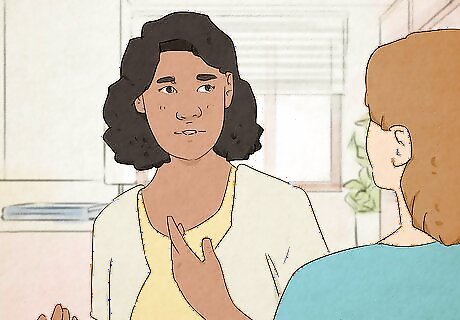
Releasing your feelings might help you work through them. Call up a friend or a family member and talk to them about what’s on your mind. They might be able to offer you advice, but they can also just be a listening ear as you express your worries. You could also talk to a mental health professional like a therapist or a counselor. They can help you cope with your anxiety over time so you don’t have to deal with a nervous stomach as often.
Keep a journal.

Work through your emotions in a healthy way. Set aside 5 to 10 minutes of your day to sit down and write in a journal. You could jot down your thoughts, your feelings, what you did that day, or what you’re looking forward to next. Don’t worry about grammar or sentence structure—simply write until you don’t have anything else to say. Journaling works well over a long period of time. Try to journal daily to relieve stress and anxiety.
Get some exercise.

It will release endorphins and help counteract stress. Endorphins are often called “happy chemicals,” and for good reason. When you exercise, your body releases endorphins in your brain that lift your mood and make you feel better almost instantly. You could try running, jogging, swimming, jumping rope, weight lifting, or cycling. Even just 15 minutes of exercise can help you feel better.
Do some yoga.
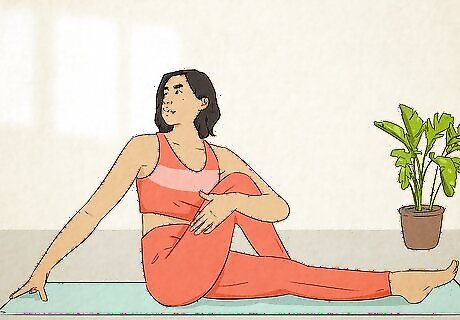
It’s a relaxing way to get some exercise. Change into workout clothes and roll out your yoga mat. Look up a beginner’s yoga video online to follow along with simple poses. Focus your mind on your body, and concentrate on exercising instead of thinking about what’s making you nervous. Doing yoga for 15 minutes every day can help lower your stress and anxiety levels overall.
Try meditation.
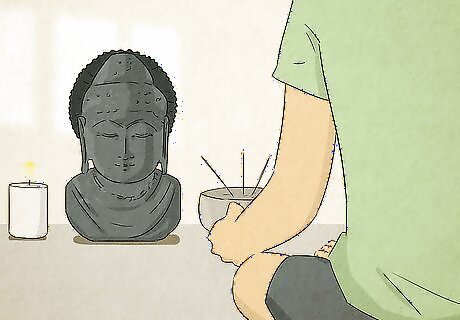
Empty your mind to get rid of your nervousness. Sit in a comfortable spot and focus on breathing deeply. Try to think about nothing at all, and focus on how your body feels in the moment. Try to do this for at least 10 minutes to calm your stomach and your nerves. Thinking about nothing can be tough, especially when you first start. You can look up a guided meditation video to help you along if you need to.
Practice mindfulness.

Focus on your body as it exists right now. Try not to worry about what’s going to happen in the future or what has happened in the past. Think about how your body feels, and focus on what you’re doing in this exact moment. It might be helpful to think about your senses. What can you see, hear, feel, touch, and smell right now?
Confront the source of your nerves.
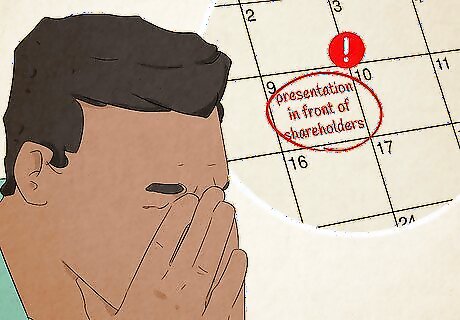
It’s the best way to stop a nervous stomach for good. If you’ve overcommitted to plans and you’re stressed out, call and cancel a few so you feel better. If you’re stressed about seeing your least favorite relative at dinner, make plans with a friend instead. The less stressed you feel, the better your stomach will be. Some big things, like debt, can’t be solved in the moment. If you have a large stressor that you can’t take care of right away, try making an action plan to solve it by taking baby steps. For instance, you could create a budget and plan to set aside $100 each month to pay off your debt.
Repeat a mantra to yourself.
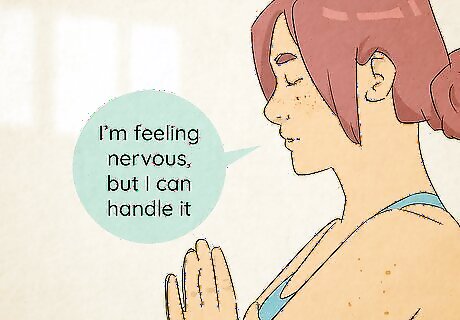
You can say it out loud or inside your head. Tell yourself that everything’s going to be okay, and that you don’t need to worry. Some quality mantras include: “I’m feeling nervous, but I can handle it.” “I am bigger than my anxiety.” “This feeling will pass.”
Avoid caffeine and alcohol.

Both of these can give you more anxiety and upset your stomach. If you’re dealing with cramps, nausea, or bloating, try not to drink anything that contains alcohol or caffeine. When you’re thirsty, go for a glass of ice water instead to wake you up and keep you hydrated. Caffeine is a type of stimulant and will amplify the effects of adrenaline in a stressful situation, as it activates your sympathetic nerve system and can induce a "fight-or-flight" response. Drinking alcohol makes your stomach produce more stomach acid, which can intensify bloating, cramping, nausea, and vomiting.
Don’t eat anything.

Food can make your stomach feel worse. If you’re already nervous, try not to eat anything until your stomach ache goes away. If your stomach is empty, it will probably hurt less. If you’re feeling hungry, try eating something small and plain, like crackers or toast. Or, go for a hard candy like ginger or peppermint to help soothe your stomach.


















Comments
0 comment